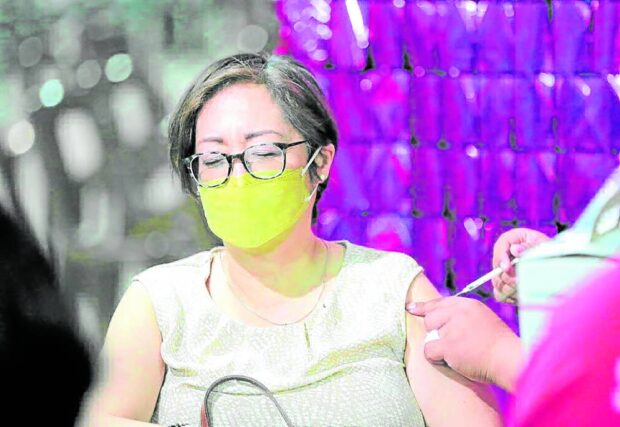
Inquirer photo/Grig C. Montegrande
MANILA, Philippines — When the first COVID-19 vaccines were rolled out in mid-March 2021, Pasay City resident Rowena, 63, refused to get inoculated against the virus.
It took her more than a month, on April 12, 2021, to get her first shot of CoronaVac (also called Sinovac), the COVID-19 vaccine developed by Chinese pharmaceutical firm Sinovac Biotech. Her senior citizen husband, who accompanied her, also took the shot.
READ: DOH: No budget for new vaccines vs ‘FLiRT’ variants of COVID-19
“I was only forced to get a Sinovac shot because my children said that they will not talk to me anymore and I could not meet my grandchildren if I don’t get vaccinated. But by God’s grace, I am still okay and have not been hospitalized or have severe COVID-19 ever since,” Rowena told the Inquirer on Sunday.
She was “very hesitant” to get Sinovac, mainly because of the Facebook posts she read warning her that it was “not as effective as other vaccines, especially those made in the United States.”
After receiving two doses of Sinovac, she opted to get a booster shot of Pfizer on Nov. 30, 2021, upon the recommendation of her doctor.
“An acquaintance told me that her friend’s son, who is a seafarer, was not allowed to board their ship when his employer learned that he got Sinovac. He got another shot of Pfizer, and that’s only when he is allowed to work,” Rowena said.
She also read posts saying that Sinovac was “made from a virus, and it’s not safe to be taken.”
Rowena was among the millions of Filipinos who were victimized by an alleged secret psychological operations campaign launched by the US military to discredit China’s Sinovac inoculation, which, according to a recent Reuters investigative report, was a payback for Beijing’s efforts to blame Washington for the pandemic.
No explanation offered
The Department of Health (DOH) over the weekend called on relevant authorities to probe the findings of the Reuters story.
“The findings by Reuters deserve to be investigated and heard by the appropriate authorities of the involved countries,” Albert Domingo, spokesperson for the DOH, said on Sunday. He refused to answer follow-up questions.
Rowena was “surprised” about the Reuters report and admitted she might have read several posts that were part of the US campaign.
“But I don’t really care. What I follow is what my body feels,” she said. She recalled experiencing weakness and light-headedness after receiving two doses of Sinovac but her doctors told her it was a “normal” side effect of the vaccine.
She also did not get additional booster shots for COVID-19, even if they were available for free, and has no plan to get boosters against new COVID-19 variants.
“I will just eat more healthy fruits and vegetables to not get sick,” she said. But she told the Inquirer she would again be compelled to take them if her children and grandchildren ask her to do so. “I could not resist them, of course.”
According to the Food and Drug Administration, from March 1, 2021, to Dec. 31, 2023, more than 181 million doses of COVID-19 were administered from the seven brands of vaccine it granted an emergency use authorization, namely Coronavac, AstraZeneca, Sputnik, Cominarty (Pfizer), Moderna, Janssen and Sinopharm.
Out of the total vaccines administered, CoronaVac’s share was the second-highest at 26.8 percent (48.7 million doses), behind Pfizer’s 77 million doses, equivalent to 42.4 percent.
House thorough probe
Deputy Minority Leader France Castro on Sunday called on the leadership of the House of Representatives to launch a deeper look into the findings of the Reuters report.
Castro, the ACT Teachers party list representative, said the congressional inquiry should determine the extent of damage the campaign brought to the Philippines and hold the people behind it accountable.
In a statement, the lawmaker denounced the Pentagon for its supposed campaign, which she described “deeply concerning” and needed immediate investigation.
She cited the Reuters report, which identified more than 300 fake accounts on X (formerly Twitter) created in 2020 and spread similar messages of distrusting the Chinese vaccines.
“The impact of this operation on public health cannot be overstated,” Castro said.
She lamented how the campaign contributed to vaccine hesitancy in the Philippines, resulting in the unnecessary loss of lives. —with reports from Jeannette I. Andrade and Russel P. Loreto